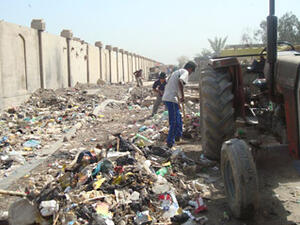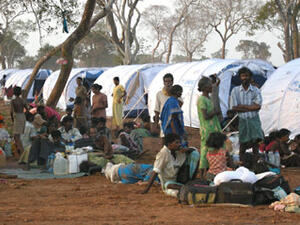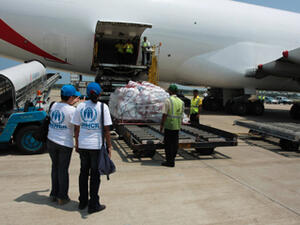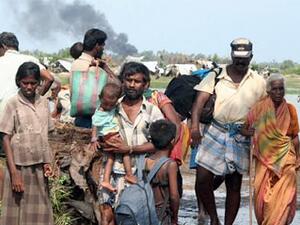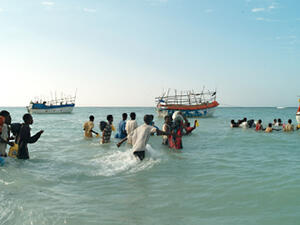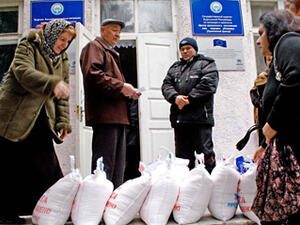From Mogadishu to Budapest: A refugee's journey to EU citizenship
From Mogadishu to Budapest: A refugee's journey to EU citizenship

Samira goes shopping for clothes in her new homeland.
BUDAPEST, Hungary, July 10 (UNHCR) - Samira Németh is adjusting remarkably well in Hungary, considering the trauma and hardship the 18-year-old endured in her native Somalia before reaching Budapest.
The young woman has also discovered a whole new set of relatives since being resettled last month with UNHCR help in the land of her father, a Hungarian national who made a life for himself in Somalia until his murder by gunmen in Mogadishu in 2005.
And there is more good news on the horizon; the rest of her family - mother Herera and four siblings in Somalia and a brother in Kenya - may be allowed to join Samira and her long-lost brother Sandor in Hungary.
Somalia has been a volatile country ever since the overthrow of the Siad Barre regime in 1991, but Samira never thought of leaving until the death of her father, Lajos Németh, and three of his other children in the 2005 attack.
And even then, she decided to hang on in Mogadishu - even as the security situation deteriorated in the Somali capital in 2006 and 2007, causing tens of thousands to flee - in the hope that her surviving relatives, who fled after the killings, would return.
"I never gave up hope that I would see my sisters and brothers and my mother again," recalled Samira, who continued going to school and was taken care of by a neighbour. "But finally, my caretaker told me my only option to stay alive was to flee to Kenya and seek asylum in Dadaab."
In January, she took the advice and crossed the border into north-east Kenya, where she found shelter as a refugee in the sprawling Dadaab camps, home to some 190,000 Somali refugees. But her problems were not over.
Samira found herself facing unwelcome attention from a much older Somalia man, who wanted to marry her so that he could get to Europe. Her mixed blood also caused problems in Dadaab.
"My skin is much lighter and I have always looked different. I have always been mocked by other children, but I could cope with it as long as I had my family by my side," she said, adding: "In Dadaab, I decided not to go to school to avoid the curious eyes of other people."
But this, ironically, worked in her favour because a UNHCR worker noticed her absence from class and went to talk to her. Her story soon came out and UNHCR, armed with documentary proof of Samira's ancestry, contacted the Hungarian authorities.
Her case was rushed through the system and on June 18, with help from UNHCR and non-governmental organization Hungarian Baptist Aid, she arrived in Budapest from Nairobi on her new Hungarian passport. There were a couple of surprises in store.
The Hungarians had discovered that her older brother Sándor, who had disappeared from her life years earlier, was living in Hungary, while Samira's paternal aunt and uncle were alive and living in a village near the southern city of Pécs.
Sándor had reached Hungary a few months earlier with a group of Somali asylum seekers and was living in a refugee reception centre. He was soon reunited with the sister he had not seen in seven years, while their aunt and uncle agreed to provide them with a new home.
Samira's finally getting to do the kinds of things that young people her age take for granted in many countries around the world, like going shopping without unescorted and without fear of attack.
And soon she may have even more reason to rejoice. Another lost brother, Bela, has surfaced in Dadaab recently, while her mother has been contacted by telephone living near Mogadishu with her four youngest children.
"UNHCR is helping the Hungarian and Kenyan authorities to find out about the intentions and possibilities of the Németh family members in Kenya and Somalia," revealed Lloyd Dakin, UNHCR's Budapest-based regional representative. "If everything goes well, Budapest might greet six new Hungarian citizens soon."
Samira, meanwhile, is basking in the love and attention of new relatives. "When I left Somalia, I did not even have hope that I would stay alive or see any of my family members again. And now, here I am in Hungary, together with my brother, my aunt, uncle and cousins. I feel like I have got my lost life back."
She will never be able to bring back her father and her three slain siblings, but a least she now has a life to look forward to.
By Andrea Szobolits in Budapest, Hungary




